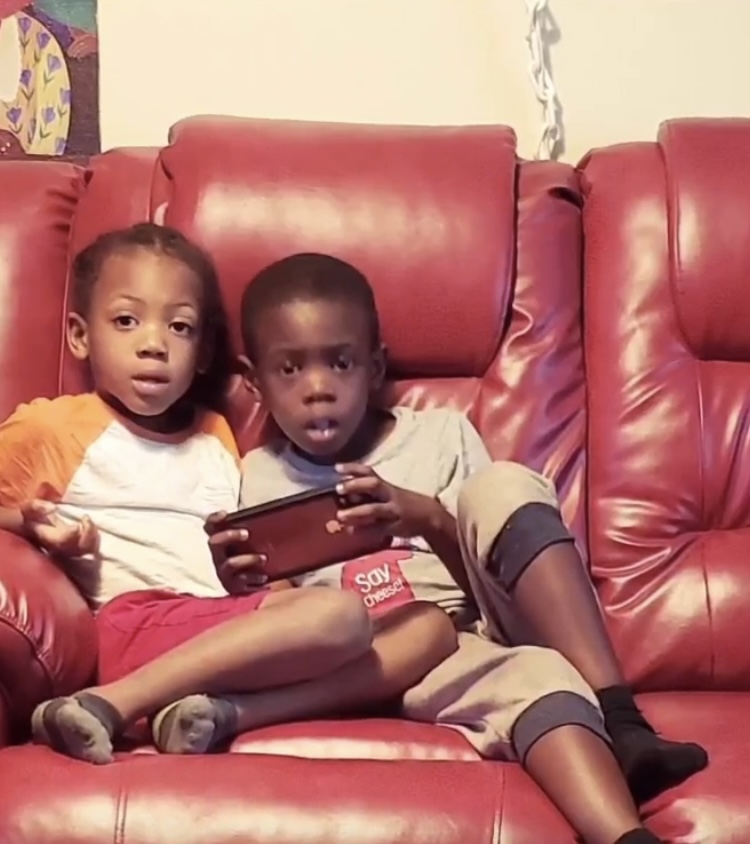In today’s society, cell phones have become exceedingly prominent. Especially with all this new technology arising, including the iPhone. A cell phone is a telecommunication device that uses a cellular radio system to function, providing an inexpensive means of communication.
Anywhere you go, you are going to see someone with a phone from the always needing help grannies to little children.
Many sources argue that the usage of cell phones has positive effects on a child’s development when it comes to openness and education. But I’m going to say I disagree. The amount of cellphone usage a child endures can cause poor health and lack of interaction. In this day and age, many people are just popping out babies, left and right without knowing anything about how to raise a baby. So, they throw a phone in their face. This leaves parents lacking awareness and knowledge when it comes to dealing with children, and with all the babies being made now it is crucial to know what harms a child and what doesn’t.
Thus, the question arises, to what extent does the usage of cell phones affect the development of a child?
The usage of cell phones causes children to become less interactive. According to “The OSF Healthcare,” it states that, “children ages 8 to 10 spend an average of six hours per day in front of a screen, kids ages 11 to 14 spend an average of nine hours per day in front of a screen and youth ages 15 to 18 spend an average of seven and a half hours in front of a screen.” Oftentimes children spend more time interacting on their cell phones than they do interacting with each other.
Children don’t interact as much as they used to because of the addiction they have to cell phones. While cell phones do provide an easier way to communicate a.k.a through text messages and social media, especially in school, it isn’t all helpful when it comes to connecting with others on a physical level.
In addition to that, the invention of cell phones has created many communicative disadvantages. Cell phones lessen the quality of conversations and decrease the empathetic connection that individuals feel towards one another. This lack of face-to-face communication can make a child slowly become isolated and lost, making the child want to use their cell phone more and more, leaving them feeling alone.
This is because when a child is on their phone and has an app, such as Instagram, they can pretend to be someone their not and can say things they wouldn’t usually say, which inarguably makes them feel happier, when in reality it is making them more confined in their minds. The more a child stays on a cell phone, the less interactive they are going to become with their external surroundings, and social media can play a big role in this.
Nowadays, peer validation can be quantified via the number of likes, comments, and shares a child receives on their posts. Popularity is measured by the number of followers on a social media handle. According to “McNulty Counseling and Awareness”, it states that “interacting in this way can become ‘socially addicting’ because the reward center in the brain releases ‘feel-good’ chemicals when a child receives a notification of another ‘like,’ thus reinforcing the repetition of social media posting behaviors.” Social media has taken a huge turn in today’s society causing children to become more absorbed into their phones than ever, wanting to have it by their side 24/7 and feeling useless without it.
When a child is feeling down, they may post a picture to receive some sort of validation from their peers to ultimately feel better whether that be from a like or a positive comment. When it comes to something as sensitive as the development of a young child, we must take into account that a child seeking peer validation is going to grow up with the mentality that likes and attention are a necessity to having happiness.
Humans in general, rely so much on what others think, making individuals more self-conscious. The usage of cell phones tremendously affects the development of a child negatively by making them less interactive and more self-conscious.
Additionally, children are extremely vulnerable when it comes to the effects of the environment around them, including the radiation of cell phones. The radiation from cell phones or anything including microwaves, lamps, and the sun isn’t taken seriously but is essential to avoid when having a young child.
According to “Parenting,” it states that, “Radiation can more deeply penetrate their brain tissue which is more conductive than an adult’s because it contains a higher concentration of fluids and ions. One study found that a cell phone call lasting only two minutes causes brain hyperactivity that persists for an hour in children.” If a child aged eleven is on the phone for about nine hours a day, they are going to be or become hyperactive most of the time, which is extremely detrimental for the development of a child, causing them to develop addictive behavior, focusing issues, and behavioral problems.
Also, according to the “Dictionary,” Nomophobia is the physiological condition when people have a fear of being detached from mobile phone connectivity and they are going to be hyperactive all the time and parents are the ones to blame in situations like this.
Now, don’t get it all wrong I’m not saying that children don’t get distracted in school because, for the most part, they do. Any normal kid tends to wander off in that one class that is just downright boring; however, children without any medical issues can choose to focus if needed, unlike a child with an actual issue such as ADHD.
According to the “CDC,” hyperactivity or ADHD is a chronic condition that includes attention difficulty, hyperactivity, impulses, and aggression within a person, mostly in children but also can be in adults. Hyperactivity is extremely common amongst children ages 3 to 7 and is sometimes noticed later in one’s childhood and can drastically affect a child’s education. Children with hyperactivity tend to not pay attention, listen, or put in the work efforts in their given assignments at school.
Let’s take a quick moment to talk about a child’s newly forming bones. When a child or anybody for that matter, lowers their neck to look at something as basic as a cell phone, it can put a lot of stress or tension onto their spines. According to “SpineUniverse,” Lowering your neck can lead to a series of issues such as neck pain, back pain, and dizziness and can cause cervical vertigo, also known as cervicogenic dizziness. This is a feeling of disorientation or unsteadiness caused by a neck injury or health condition that affects the neck. It’s almost always accompanied by neck pain.
Your range of motion can be affected too and sometimes it comes along with a headache. Episodes of cervical vertigo go for hours, and the condition itself can last for years. Cervical vertigo is caused for many reasons but the main reason is poor posture: slouching, and/or bending your neck. When children use cell phones they are constantly looking down texting, watching videos, or taking photos putting excessive force on their necks.
Compressing the vertebrae at the top of the spine can cause back pain and loss of height. Which can and will discourage many kids who play or want to play sports. Cell phones negatively impact a child’s development because they cause a series of back and neck issues that are going to affect children as they get older.
On the contrary, others may say that cell phones positively affect a child’s development because they allow children to become more open with their parents. Now, you might be asking what a child being more open has to do with the development, especially with a cell phone. Well, cell phones are an amazing way for guardians to keep tabs on their children. Parents don’t know everything going on in their child’s life, nor do they know who is watching them or who may be close by. There are so many horror stories of children going missing.
When you track your child’s cell phone, you improve their safety. If they don’t make it to school, work, the park, or anywhere for any reason, you can find out where they are quickly. Children don’t want their parents to know where they are or what they are doing, but why do you think that is? This is because mentally children feel like they can’t be open with their parents, consequently leading children to become mischievous, misunderstood, and even rebellious.
Children ages 13-17 especially don’t want parents to have their location but for someone, such as a guardian, to keep tabs on children because friends are not that reliable. This helps with the development of a child because it is going to allow them to become more receptive to parental advice and supervision than being disastrous behind their backs.
Parents having access to a child’s location is a start to a more mentally stable and well-behaved child. Therefore, cell phones positively affect a child’s development because they allow children to be more truthful, less devious, and more comfortable overall.
Continuing, cell phones enhance the learning performance of children. The Internet offers endless research possibilities for students. According to “The Enquirer,” it states that the smartphone enables students to look up unfamiliar terms or dates the teacher mentions without skipping a beat, provided that the teacher allows students to augment lectures with phone queries. Cell phones make information easily accessible, allowing children to obtain information that is needed for school, life, and basic knowledge making them, for the most part, smarter because they are acquiring more information than ever.
Not only that but it effectively prepares children to interact with future technology. Many schools are switching to doing most work virtually rather than physically and a child having technical knowledge is going to be an advantage in the long run. Hence. cell phones positively affect the development of a child because they allow them to access information that they would need without having to do all the extra work.
There are both positives and negatives when it comes to the development of a child. Cell phones provide a means of safety and education to each child. However, cell phones can also cause poor health and children lessening their interactions with one another. Cell phones essentially help children but due to the cost, if a child is going to have a cell phone make them wait until they are mature enough to handle one.















